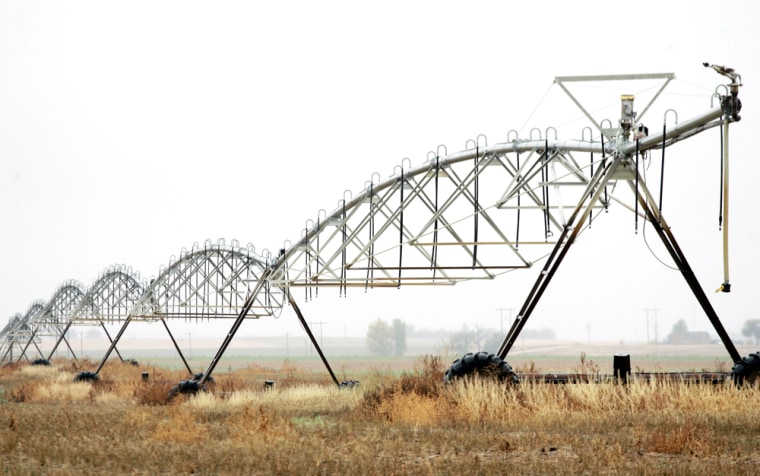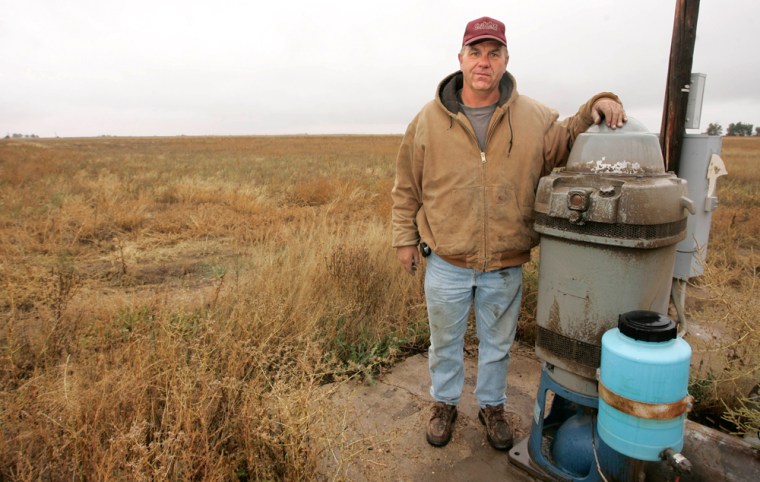If some farmers in eastern Colorado felt like they were being watched this summer, they had good reason.
Private investigators hired by some of Colorado’s fastest-growing communities spent weeks spying on them, trying to determine if they were illegally pumping water for their crops, The Associated Press has learned.
The investigators put together an elaborate database on 50 plots of land in eastern Colorado, noting things like “puddles around sprinkler perimeter” and “lush corn,” and turned it over to state engineer Hal Simpson, who is investigating the claims.
“There was one man taking pictures. My wife asked if she could help him and he sped off,” said Steve Bruntz, who recently joined other farmers at a Wiggins gas station to talk with a reporter.
Behind the fight are farmers who depend on irrigation, on one side, and cities that rely on water from the South Platte River, on the other. State water law guarantees that those with higher-priority rights get their share first.
440 farm wells ordered off
The water crisis came to a head in May when the state engineer told farmers along the South Platte to turn off 440 wells after forecasting lower-than-average river flows and well owners were unable to devise plans to replace the water they were using.
Millions of dollars worth of wheat, corn, sugar beets and melons were left to die after some farmers and three cities — Sterling, Boulder and Highlands Ranch — rejected an emergency plan that would have allowed well owners to continue pumping.
Water attorney Tim Buchanan, who represents farmers with senior water rights, said he ordered the spying campaign because he suspected some well owners were continuing to pump water.
Buchanan said water users, including communities and farmers, hired a private investigator to go out during daylight hours to survey 50 plots of land. They then paid engineers to verify the information.
“We started hearing rumors and people in the area where the wells are located called us and said people were pumping contrary to the state’s order,” he said. “We looked only at properties that had wells as their sole source of water. Not only were they wet, they were growing crops.”
Exact details of the spying program, including how many acres were studied and how much was spent to gather the information, was not disclosed.
'We shoot' trespassers warning
But word of the investigation stunned farmers who say they are struggling because the state shut down their wells this spring after complaints from those holding more senior rights to the water.
“I wish I could have caught them on my property. We shoot every other trespasser and he’d be the second one,” said David Knievel, whose name was in the database obtained by the AP.

Water attorney Veronica Sperling, who represents Boulder and Highlands Ranch, said her clients were concerned after hearing reports of illegal pumping.
Carol Ellinghouse, the water resources coordinator for Boulder, said she and others hired the investigator after she got a tip from a turf farm worker who said his neighbors were running their wells.
“They went out and some farms showed signs of being recently irrigated,” she said. “Others were pretty lush, a condition that couldn’t happen if they weren’t watering.”
John Hendrick, general manager of the Centennial Water and Sanitation District that supplies water to Highlands Ranch, said he was aware of the surveillance program and agreed with it.
“It’s like people running a stop sign or speeding,” he said. “The thing to do is identify the problem and fix it.”
Farmer John Moser, who was on the list of alleged scofflaws provided to the AP for irrigating 290 acres and growing “green and vigorous alfalfa,” said just because water is coming from a sprinkler doesn’t mean the water is coming from a well. He said he is getting his water from a small lake on his property.
“It does upset me, for in fact they don’t know the details. Does it bother me? Yes. Is there anything we can do about it? No,” Moser said. “It’s gotten out of hand. People are yelling and screaming at each other.”
